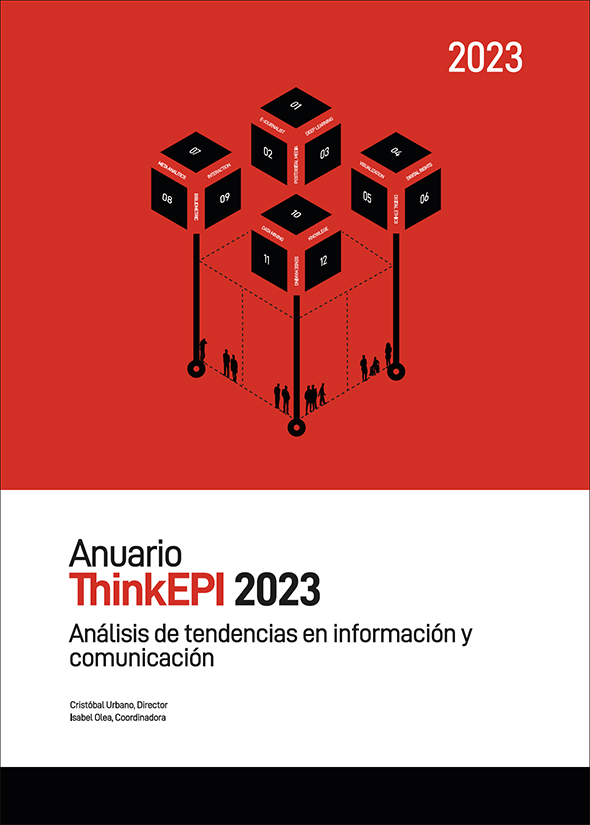Large language models: an opportunity for the library profession
DOI:
https://doi.org/10.3145/thinkepi.2023.e17a28Keywords:
Artificial intelligence, AI, Large language models, Library profession, Generative search, Bias, Ethics of technologyAbstract
Generative artificial intelligence (AI) and large language models can change the way we search, process and generate information. However, they also pose ethical and technical challenges such as inconsistencies, biases and lack of transparency. In this context, librarians play a key role, as they have the opportunity to support responsible use of this technology as well as to promote critical understanding of its limitations. Libraries, in turn, can offer spaces and resources to experiment with generative AI and encourage its use in scientific research.
Downloads
References
Bender, Emily M.; Gebru, Timnit; McMillan-Major, Angelina; Shmitchell, Shmargaret (2021). "On the dangers of stochastic parrots: can language models be too big?". FAccT ´21: Proceedings of the 2021 ACM Conference on fairness, accountability and transparency, p. 610-623. https://doi.org/10.1145/3442188.3445922
Codina, Lluís (2023). "Buscadores alternativos a Google con IA generativa: análisis de You.com, Perplexity AI y Bing Chat". Infonomy, v. 1, e23002. https://doi.org/10.3145/infonomy.23.002
De-Vynck, Gerrit (2023). "ChatGPT "˜hallucinates´: some researchers worry it isn´t fixable". The Washington Post, May 30. https://wapo.st/3KN7dRn
Devlin, Jacob; Chang, Ming-Wei; Lee, Kenton; Toutanova, Kristina (2018). "BERT: pre-training of deep bidirectional transformers for language understanding". arXiv. https://doi.org/10.48550/arXiv.1810.04805
Griffith, Erin; Metz, Cade (2023). ""˜Let 1,000 flowers bloom´: AI funding frenzy escalates". New York Times. https://nytimes.com/2023/03/14/technology/ai-funding-boom.html
Grosse, Roger; Bae, Juhan; Anil, Cem; Elhage, Nelson; Tamkin, Alex; Tajdini, Amirhossein; Steiner, Benoit; Li, Dustin; Durmus, Esin; Perez, Ethan; Hubinger, Evan; Lukošiūtė, Kamilė; Nguyen, Karina; Joseph, Nicholas; McCandlish, Sam; Kaplan, Jared; Bowman, Samuel R. (2023). "Studying large language model generalization with influence functions". arXiv. https://doi.org/10.48550/arXiv.2308.03296
Heikkilí¤, Melissa (2023). "Why it´s impossible to build an unbiased AI language model". MIT technology review. https://technologyreview.com/2023/08/08/1077403
Lo, Leo S. (2023). "AI policies across the globe: Implications and recommendations for libraries". IFLA Journal. https://doi.org/10.1177/03400352231196172
Lopezosa, Carlos (2023a). "Bing chat: hacia una nueva forma de entender las búsquedas". Anuario ThinkEPI, v. 17, e17a04. https://doi.org/10.3145/thinkepi.2023.e17a04
Lopezosa, Carlos (2023b). "ChatGPT y comunicación científica: hacia un uso de la inteligencia artificial que sea tan útil como responsable". Hipertext.net, n. 26, pp. 17-21. https://doi.org/10.31009/hipertext.net.2023.i26.03
Mitchell, Melanie; Krakauer, David C. (2023). "The debate over understanding in AI´s large language models". PNAS, v. 120, n. 13, e2215907120. https://doi.org/10.1073/pnas.2215907120
Orduña-Malea, Enrique; Cabezas-Clavijo, Álvaro (2023). "ChatGPT and the potential growing of ghost bibliographic references". Scientometrics, n. 128, p. 5351-5355. https://doi.org/10.1007/s11192-023-04804-4
Tarnoff, Ben (2023). "Weizenbaum´s nightmares: how the inventor of the first chatbot turned against AI". The Guardian, 25 julio. https://theguardian.com/technology/2023/jul/25/joseph-weizenbaum-inventor-eliza-chatbot-turned-against-artificial-intelligence-ai
Downloads
Published
How to Cite
Dimensions


